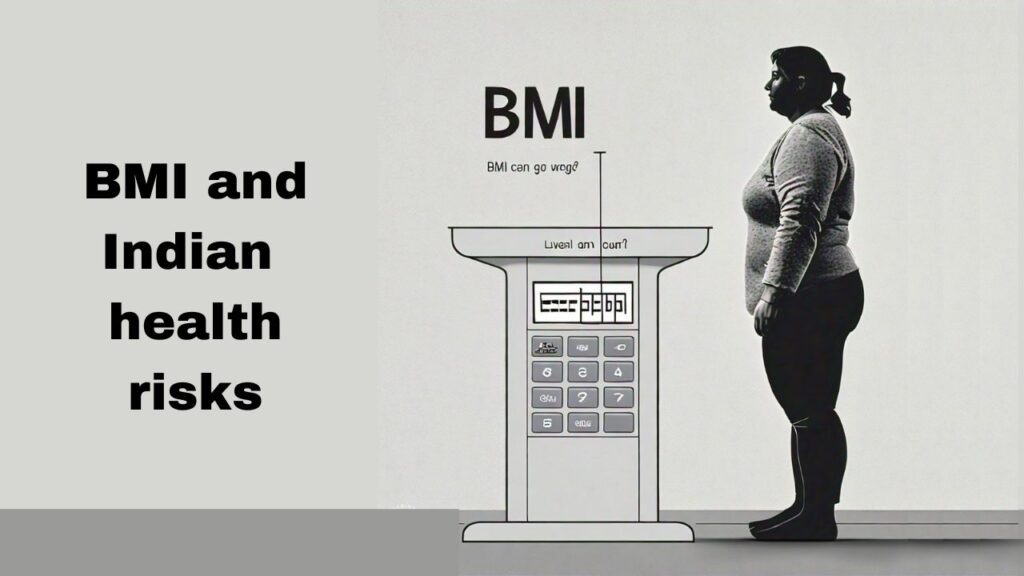BMI (Body Mass Index) is commonly used tool to assess if someone’s weight is within a healthy range based on their height. However, BMI has significant limitations, particularly for assessing the health of specific populations like Indians. Below are some reasons why BMI may not be an accurate health indicator for Indians:
1. Overlooks Fat Distribution
- Visceral Fat and Abdominal Obesity: Indians tend to accumulate more visceral fat (fat around internal organs) and abdominal fat, even with a “normal” BMI. This type of fat increases the risk of metabolic conditions such as diabetes and heart disease, making BMI an unreliable measure of health.
- Higher Risk at Lower BMI: Indians are at a greater risk of developing conditions like Type 2 diabetes and cardiovascular diseases, even at lower BMI ranges. Studies show that Indians may experience metabolic syndrome with a BMI of 23 and above, which might be categorized as normal or overweight or obese by standard BMI criteria.
2. Fails to Differentiate Between Muscle and Fat
- Muscle Mass vs. Fat Mass: BMI does not differentiate between muscle and fat. Indians, who often have less muscle mass than Western populations, may have a misleading BMI since they may carry a higher percentage of body fat despite having a low BMI.
- Sarcopenia: As Indians age, they may lose muscle mass (sarcopenia), which could lead to poor health outcomes such as frailty and metabolic issues despite having a normal BMI.
3. Neglects Ethnic Differences
- Distinct Body Composition in South Asians: South Asians, including Indians, have a different body composition compared to other populations. They generally have a higher body fat percentage and lower muscle mass at the same BMI. Thus, BMI standards derived from Western populations may not be suitable for Indians.
- Need for Adjusted Cutoffs: Various health experts recommend lower BMI thresholds (23-24.9 for overweight and 25+ for obesity) for South Asians since they face increased health risks at lower BMI levels than Westerners.
4. Doesn’t Reflect Metabolic Health
- Thin on the Outside, Fat on the Inside (TOFI): Many Indians with a seemingly normal BMI may have hidden visceral fat, which puts them at risk for metabolic syndrome, insulin resistance, and diabetes. BMI alone doesn’t capture this health risk.
- Metabolically Healthy Obesity (MHO): Some people with a high BMI may still be metabolically healthy, and BMI alone cannot distinguish between those who are overweight but healthy and those at risk of severe health problems.
5. Influence of Culture and Diet
- Dietary Habits: Traditional Indian diets, rich in refined carbohydrates such as rice and bread, can lead to metabolic issues even if BMI is within the normal range.
- Physical Activity Levels: BMI also does not account for lifestyle factors like physical activity. Many Indians with a normal BMI may have sedentary lifestyles, increasing their risk of health complications.
6. Lacks Consideration of Additional Health Metrics
- Waist-to-Hip Ratio (WHR): Indians often have a higher waist-to-hip ratio, which is a better measure of health risks than BMI. Waist circumference and WHR can more effectively predict the likelihood of heart disease and diabetes.
- Body Fat Percentage: Tools such as DEXA scans, skinfold calipers, or bioelectrical impedance provide a clearer picture of body fat percentage and distribution, making them more reliable than BMI alone.
Conclusion
BMI does not provide an accurate assessment of health for Indians due to factors such as fat distribution, muscle mass, and metabolic health. A more comprehensive evaluation, including waist circumference, body fat percentage, and metabolic markers, is crucial for assessing health risks like diabetes and heart disease, which are prevalent in the Indian population.
About the author

Asma Siddiqua
Asma Siddiqua is a Senior Consultant and Clinical Dietitian at ProGen Weight Management with over 5 years of experience in managing obesity and related co-morbidities. She specializes in reversing diabetes and helping clients achieve and maintain healthy body fat percentages. Asma is dedicated to providing personalized, evidence-based dietary guidance to support sustainable weight loss and improved overall health.
About the author
Asma Siddiqua

Asma Siddiqua is a Senior Consultant and Clinical Dietitian at ProGen Weight Management with over 5 years of experience in managing obesity and related co-morbidities. She specializes in reversing diabetes and helping clients achieve and maintain healthy body fat percentages. Asma is dedicated to providing personalized, evidence-based dietary guidance to support sustainable weight loss and improved overall health.


